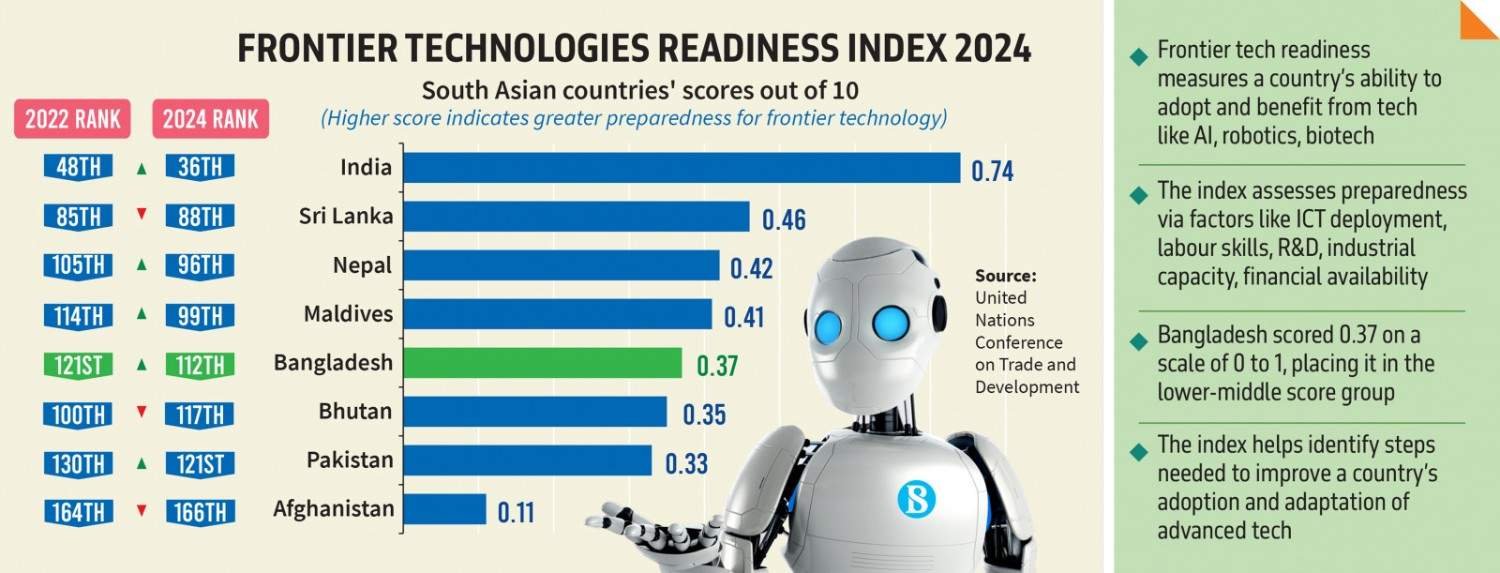Bangladesh has made notable strides in its preparedness for frontier technologies, ranking 112th out of 170 countries in the 2024 “Technology and Innovation Report” published by the United Nations Conference on Trade and Development (UNCTAD). The report highlights the country’s progress in adopting advanced technologies such as artificial intelligence (AI), robotics, and biotechnology, which are crucial for economic development and governance.
The Frontier Technology Readiness Index measures a country’s ability to adopt, develop, and benefit from these technologies, taking into account factors like infrastructure, skills, innovation capacity, and policies. Bangladesh improved its position from 121st in 2022, surpassing countries such as Bhutan, Pakistan, and Afghanistan in South Asia. However, India remains the regional leader in frontier technology readiness.
Bangladesh scored 0.37 on a scale of 0 to 1, placing it in the lower-middle score group. Among the five key indicators used in the index, Bangladesh performed best in research and development (R&D), ranking 61st globally. It also ranked 90th in access to finance, 108th in industrial capacity, and 132nd in labor skills. However, the country’s performance in ICT development was the weakest, with a ranking of 140th, reflecting challenges in internet access and download speed.
The report defines frontier technologies as emerging innovations with transformative potential, such as AI, green hydrogen, and gene editing, that offer opportunities for economic growth, sustainability, and improved governance. The index categorizes frontier technologies into three broad groups: Industry 4.0 technologies (AI, Internet of Things, Big Data, 5G, etc.), Green frontier technologies (solar power, biofuels, electric vehicles, etc.), and Other frontier technologies (nanotechnology, gene editing).
The best-prepared countries for these technologies are the United States, Sweden, the United Kingdom, the Netherlands, Singapore, Switzerland, and South Korea, while developing nations like Brazil, China, India, and the Philippines have shown strong performance in digital readiness. Countries least prepared are mainly in Africa and Latin America.
In South Asia, India ranks the highest, placing 36th globally with an overall score of 0.74. Sri Lanka, Nepal, and the Maldives follow India, with Bangladesh ranked 112th. Bhutan, Pakistan, and Afghanistan lag behind, with Afghanistan at the bottom of the region in 166th place.
The report also emphasizes the growing importance of AI, predicting a market value of $4.8 trillion by 2033. It calls for developing countries, including LDCs (Least Developed Countries) like Bangladesh, to align AI adoption with national development goals. Despite rapid growth in AI, access to AI infrastructure remains concentrated in developed economies, with a few global corporations dominating the field.
As AI and frontier technologies continue to shape the future, Bangladesh’s progress in these areas, particularly in R&D and digital infrastructure, indicates positive steps toward enhancing its competitiveness on the global stage. However, addressing gaps in ICT development and workforce skills will be key to accelerating the country’s digital transformation.















